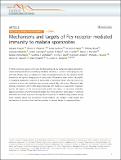| dc.contributor.author | Gaoqian Feng, Bruce D. Wines, Liriye Kurtovic, Jo-Anne Chan, Philippe Boeuf, Vanessa Mollard, Anton Cozijnsen, Damien R. Drew, Rob J. Center, Daniel L. Marshall, Sandra Chishimba, Geoffrey I. McFadden, Arlene E. Dent, Kiprotich Chelimo, Michelle J. Boyle, James W. Kazura, P. Mark Hogarth & James G. Beeson | |
| dc.description.abstract | A highly protective vaccine will greatly facilitate achieving and sustaining malaria elimination. Understanding mechanisms of antibody-mediated immunity is crucial for developing vaccines with high efficacy. Here, we identify key roles in humoral immunity for Fcγ-receptor (FcγR) interactions and opsonic phagocytosis of sporozoites. We identify a major role for neutrophils in mediating phagocytic clearance of sporozoites in peripheral blood, whereas monocytes contribute a minor role. Antibodies also promote natural killer cell activity. Mechanistically, antibody interactions with FcγRIII appear essential, with FcγRIIa also required for maximum activity. All regions of the circumsporozoite protein are targets of functional antibodies against sporozoites, and N-terminal antibodies have more activity in some assays. Functional antibodies are slowly acquired following natural exposure to malaria, being present among some exposed adults, but uncommon among children. Our findings reveal targets and mechanisms of immunity that could be exploited in vaccine design to maximize efficacy. | en_US |

